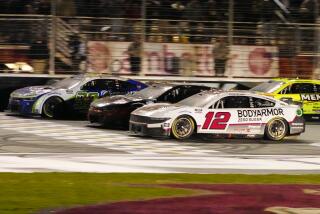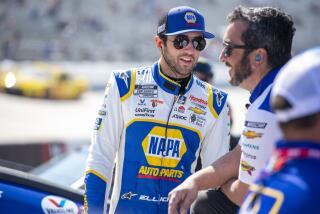In NASCAR, a lower finish can lead to a bigger payday
- Share via
Driver Matt Kenseth had a tough night at Phoenix International Raceway last Saturday, finishing 38th out of 43 cars in the NASCAR Sprint Cup race. That earned him $111,466 in prize money.
But David Gilliland finished 15th in the race and got a paycheck of only $91,658.
How can that be?
Welcome to NASCAR’s complex and, some say, archaic pay structure that taps into several sources of prize money beyond the basic purse for each race.
Here’s how it works: The total NASCAR prize money -- $5.1 million for the Subway Fresh Fit 500 at Phoenix -- includes not only the race’s basic purse but several additional “contingency awards” and other special payments.
They include cash from television revenues, specific awards from two dozen manufacturers involved in NASCAR, and money from the Sprint Cup championship points earned in that race.
Dow Automotive, for instance, awarded $5,900 at Phoenix for the best “strategic call of the race,” which went to winner Jimmie Johnson for gambling on fuel at the end.
Goodyear had a $5,500 award for the driver that posted the fastest lap while leading. Dale Earnhardt Jr. nabbed that one Saturday.
But perhaps the main contributor to the disorderly payouts is NASCAR’s Winner’s Circle Program, which includes the 12 drivers with the most wins from the prior year.
Those dozen racers -- or technically, their team owners -- are guaranteed a certain amount of money in each race regardless of how they finish. Kenseth, with two wins in 2007, is a member of that club, and Gilliland, who was winless last year, is not.
And that’s a key reason why Kenseth won more money for finishing 38th in Phoenix than Gilliland did for finishing 15th.
And then there was Ryan Newman, who finished last at Phoenix because of a blown engine, but made $110,718, compared with Earnhardt’s paycheck of $99,125 for finishing seventh.
But the biggest payout in a NASCAR Cup race still goes to the winner, and never has the winner won less money than a lower-place finisher, NASCAR spokesman Jim Hunter said. In Phoenix, for instance, Johnson won $262,111.
All of this is spelled out in small print on a four-page entry form printed on yellow paper for each race.
Why does NASCAR have such a convoluted system? The basic formula was started more than 30 years ago as a way to entice as many teams as possible to enter races, Hunter said.
This was long before corporate sponsorship flooded into NASCAR “and we needed fields of cars, so we had to be creative,” he said.
In addition, back then the gap was much wider between well-funded teams such as Petty Enterprises and the Wood Brothers and teams on smaller budgets.
The special awards were intended to help the smaller teams stay in the sport, especially when they had to travel long distances to compete at remote tracks.
“When we started this program people needed business plans for the year and they didn’t have million-dollar sponsors,” he said. “That’s the idea.”
Now, of course, NASCAR and its teams do have a multitude of deep-pocketed sponsors, and top drivers such as Johnson, Earnhardt and Jeff Gordon earn millions of dollars each year away from the track by endorsing their products and services.
That’s partly why some drivers don’t even bother looking at the prize money they win at each race.
“I don’t get caught up in that, simply because there’s just no formula to it,” said Greg Biffle, driver of the No. 16 Ford at Roush Fenway Racing.
“You’ll just never understand it. The thing I do look at is how much it paid to win. I’ll look at that.”
--
More to Read
Go beyond the scoreboard
Get the latest on L.A.'s teams in the daily Sports Report newsletter.
You may occasionally receive promotional content from the Los Angeles Times.










